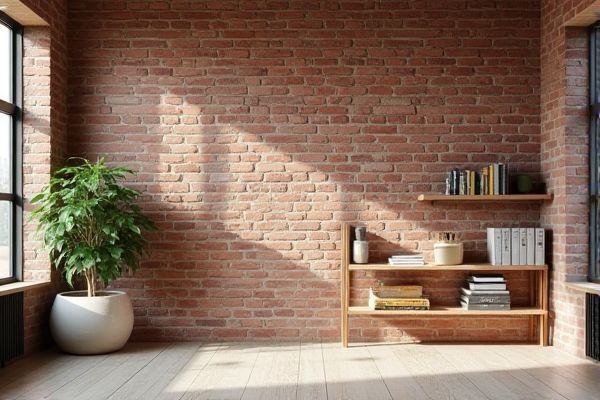
Brick walls offer uniformity, ease of installation, and strong structural support, making them ideal for modern construction projects. Stone walls provide natural durability and aesthetic appeal with unique textures that blend seamlessly into outdoor landscapes; explore the rest of the article to discover which option suits Your needs best.
Table of Comparison
| Feature | Brick Wall | Stone Wall |
|---|---|---|
| Material | Manufactured clay bricks | Natural stone blocks |
| Durability | Moderate; prone to weathering | High; extremely weather-resistant |
| Cost | Lower initial cost | Higher initial cost due to material and labor |
| Maintenance | Requires regular mortar repairs | Minimal maintenance needed |
| Insulation | Good thermal insulation | Excellent thermal mass, retains heat |
| Appearance | Uniform, modern look | Natural, rustic aesthetic |
| Construction Time | Faster to build | Slower, labor-intensive process |
| Environmental Impact | Higher carbon footprint due to manufacturing | Lower impact; uses natural materials |
Introduction to Brick Walls and Stone Walls
Brick walls consist of uniform clay or concrete bricks bonded with mortar, offering consistent structural integrity and ease of installation. Stone walls utilize natural stones such as granite, limestone, or fieldstone, providing unique textures and enhanced durability in various architectural styles. Both materials serve as fundamental building elements, with brick walls favored for modern construction and stone walls prized for traditional and rustic aesthetics.
Material Composition: Brick vs Stone
Brick walls consist primarily of clay or shale shaped into uniform rectangular blocks and fired at high temperatures for durability and strength. Stone walls are composed of natural rock materials such as granite, limestone, or sandstone, offering varied textures and greater natural resistance to weathering. The material composition influences factors like structural integrity, maintenance requirements, and aesthetic appeal in construction projects.
Construction Methods Compared
Brick walls are typically constructed using uniform clay bricks laid in horizontal courses with mortar joints, allowing for precise alignment and faster installation. Stone walls involve stacking irregular or dressed stones, often requiring skilled masons to fit pieces together securely with mortar or dry-stacking techniques for structural integrity. Your choice affects labor time, material costs, and the wall's long-term durability due to these distinct construction methods.
Aesthetic Differences and Design Options
Brick walls offer a uniform, classic look with consistent color and texture that suits both traditional and modern designs, while stone walls provide a natural, rustic aesthetic featuring varied shapes, colors, and textures for a more organic appearance. Your design options expand with brick walls through patterns like herringbone or running bond, enhancing geometric appeal, whereas stone walls allow for creative assemblages of irregular stones or carefully cut blocks for a unique, timeless charm. Choosing between brick and stone walls depends on the desired visual impact and architectural style of your space.
Durability and Longevity
Brick walls offer consistent durability due to their uniform shape and fired clay composition, providing resistance to weather and erosion over decades. Stone walls, often constructed from natural, irregular stones like granite or limestone, exhibit superior longevity by withstanding extreme environmental conditions and requiring minimal maintenance. Both materials maintain structural integrity over long periods, but stone walls typically outlast brick walls, especially in harsh climates.
Cost Analysis: Brick Wall vs Stone Wall
Brick walls generally offer a more cost-effective solution compared to stone walls due to lower material and labor expenses, with average brick wall installation costing between $15 to $30 per square foot. Stone walls, while more durable and aesthetically unique, often range from $25 to $60 per square foot because of the higher price of natural stone and specialized masonry work required. Your choice should consider both the initial investment and long-term maintenance costs, as stone walls tend to require less upkeep but come with a higher upfront expenditure.
Maintenance Requirements
Brick walls require regular inspection for mortar deterioration and occasional repointing to maintain structural integrity, while stone walls demand less frequent maintenance but may need periodic cleaning to prevent moss and algae buildup. Both materials benefit from sealing to protect against moisture damage, yet stone's natural durability often results in fewer repairs over time. Your choice depends on how much time and effort you're willing to invest in upkeep.
Insulation and Energy Efficiency
Brick walls offer better insulation due to their dense structure, which helps retain heat and regulate indoor temperatures effectively. Stone walls, while durable, tend to have higher thermal mass but lower insulation properties, leading to potential heat loss without added insulating materials. Incorporating insulation layers in stone walls enhances energy efficiency by reducing heat transfer and improving thermal comfort.
Environmental Impact and Sustainability
Brick walls generally have a higher environmental impact due to energy-intensive manufacturing processes and the use of non-renewable clay resources, whereas stone walls utilize natural, abundant materials with minimal processing, resulting in a lower carbon footprint. Stone walls offer greater durability and longevity, reducing the need for frequent repairs and replacements, which enhances overall sustainability. Choosing stone for your construction project supports eco-friendly building practices by minimizing greenhouse gas emissions and conserving natural resources.
Choosing the Best Wall Type for Your Project
Brick walls offer uniformity, ease of installation, and cost-effectiveness, making them ideal for residential projects and aesthetic-focused designs. Stone walls provide superior durability, natural insulation, and a timeless appearance, suitable for landscaping, retaining walls, and heritage constructions. Assessing factors like budget, climate, structural needs, and desired visual impact ensures selecting the optimal wall type for your specific project requirements.
 homyna.com
homyna.com